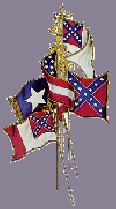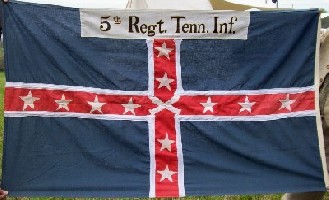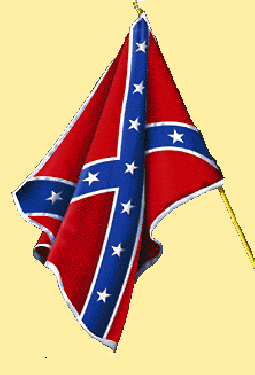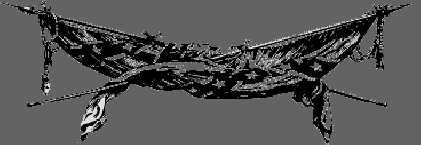

5th Regiment Tennessee Infantry "E" Company
"We serve with a purpose, to Honor and Preserve"
Who are these individuals we honourably portray? |
During a special election, held in February 1861, the voters, of Tennessee, decided by a large majority, not to call a 'secession convention.' When President Abraham Lincoln called for troops with which, to coerce Tennessee's sister Southern States, back into the Union, his obtrusive action motivated Isham G. Harris, Governor, to promptly, convene the Tennessee Legislature which then decided, to submit, the question, of "separation" from the United States and "representation," in the newly organized Confederate States, to a vote, by the people. Governor Harris commissioned Colonel William E. Travis, to raise a regiment of cavalry. It was quickly found impossible, to secure suitable arms, to equip a cavalry regiment. Due, to this problem, it was instead decided, to recruit an infantry regiment. A call was made through the columns, of the Paris Sentinel newspaper, and via word, of mouth, that all wishing, to enlist, assemble at the Courthouse in Paris, Henry County, Tennessee, Saturday 20 April. Those assembled around the Henry County Courthouse were formed, in line, on the courthouse lawn. Once formed, they were marched around the building several times, and then marched, to the campus, of the male academy. On the southern portion, of the campus, the men were counted off, and placed into eight (8) companies, of twenty-six (26) men each. Each company was instructed: elect a captain and two lieutenants; and the captain elects were directed: recruit sufficient additional men, to raise your company numbers, to about one hundred (100) men, as speedily as possible. Six (6) captain elects, succeeded, in meeting the numbers required for a company entitling their specific company, to be mustered. One company was consolidated with another smaller company, and thereby was able, to meet the number required for a company, and was mustered. Three (3) other companies were, recruited from within Henry County, and were offered and accepted as component parts, of the Regiment. A company recruited within Benton County, Tennessee and commanded by Captain Corbett, was offered and accepted, to make up the Regiment component. Once the 5th Regiment was organized, another company, recruited from within Benton County and commanded by Captain Winfrey, and a company recruited within Hickman, Fulton County, Kentucky and commanded by Captain John A Lauderdale, requested permission to unite with the Regiment and these requests were granted. With the addition, of these two companies, the Regiment was composed of twelve (12) companies exceeding the usual complement of ten (10) companies, thereby creating a very large Regiment. Monday, 20 May 1861, was selected as the time for the Regiment's permanent organization, and this day Paris, Tennessee beheld a scene, on its street, as had never before been witnessed, and such as it is never likely, to witness again. The streets, of Paris, were filled with people long before the noon hour. These people witnessed as a representative, of each Company, mounted the courtyard fence and hallooed, "Oh, yes! Oh, yes! all that belong to Captain So-and-So's Company, parade here! Parade here! With each Company formed, the Regiment began a line, of march, for McNeill's grove, located at the intersection, of the Huntington and Ft. Mason roads. Once the grove was reached, the Companies were formed into columns under the trees and commenced the election, of field officers. The primary field officers thus elected were: William E. Travis, Colonel; John D. C. Atkins, Lieutenant-Colonel; William C. Swor, Major. The remaining officers, staff and company, etc., will be identified and set forth when the original complement, of each company, is detailed in the sections under "Regiment Formation." Each man and woman who offered their service, to the Confederate States, as well as their loved ones, who were left behind, THESE ARE THE INDIVIDUALS WE HONOURABLY PORTRAY! |
What more appropriate way, to illuminate, the character, of the men, who went forth from their homes carrying the banner of Tennessee than, in the incisive words, of one, of these honourable individuals. We wish, to extend our most sincere appreciation, to Richard P'Pool, who verified the following text as being published, on page 110 and 111, of the "Confederate Veteran" magazine's March 1904 issue. These words truly manifest the character, of the individuals, we dutifully endeavor to honourably portray. |
"Unfurl the Flag!" |
A Reminiscence of 1865 by Col. Luke W. Finlay, Memphis, Tennessee |
"Recounting the reminiscences, in life, often bring with them unexpected joys. Those, of the past half century, in the United States have not, at all times, been of the most pacific nature, and yet they often teach historic lessons, forecasting characteristics and qualities varying with the characters and manhood, of a people. "We recall now, briefly, scenes simple and yet full, of romance, and none the less, of character. The organization, of the Tennessee regiments numbered Fourth, Fifth, Nineteenth, Twenty Fourth, Thirty First, Thirty Third, Thirty Fifth, Thirty Eighth, and Forty First Tennessee and the Fifth Confederate, into one, in April 1865, under James D. Tillman as Colonel, the writer as Lieutenant Colonel, and C. S. Deakin as Major, and the undaunted presence, of that company, of veterans, that were ready, to welcome death, rather than desert the post of duty are facts, of history now. |
"BIVOUAC ARMY OF THE SOUTH, April 18, 1865." |
"TO WHOM IT MAY CONCERN: |
"Greeting: Know all men by these presents, that James D. Tillman, Colonel of the Forty First Regiment, Tennessee Volunteer Infantry, has recently been appointed Colonel, of one, of the Tennessee Regiments, in this Army, and that this Regiment was composed of the remnants of the Fourth, Fifth, Nineteenth, Twenty Fourth, Thirty First, Thirty Third, Thirty Fifth, Thirty Eighth, and Forty First Tennessee Regiments and Fifth Confederate Regiment, and that the commanders of these Regiments composed, of remnants, of the aforesaid old Regiments consolidated, were selected and appointed because of their experience efficiency and gallantry. "John C. Brown, Major General; C. L. Stevenson, Major General; William B. Bate, Major General; W. J. Hardee, Lieutenant General. "From Belmont to Bentonville they had stood manfully at their post of duty, and were yet ready for the continued struggle. These Tenesseans, in the vigor of manhood, veterans and inured to arm, though having just attained manhood, bore themselves with the spirit and dash and intrepidity that had marked them, on many a field. The colors the ensign bore were the workmanship, of the ladies, of Montgomery, Alabama. How the soldiers treasured this gift! How they looked upon its beautiful folds as they flashed in the sunlight. "The capitulation at Greensboro, North Carolina then took place. The armies of the North gladly moved toward the national capital, and those, of the South, moved toward their respective States. The former were not less glad to see the end, of that era, of carnage. At the last fight incidents occurred which showed, on the one hand, the prowess, of the soldier, of the South, and on the other the willingness, of the soldier, of the North, to defer further fighting. In the last engagement a Tennessee regiment penetrated Sherman's line of battle near the center, broke through to the rear, marched around by the flank, and retook its place, in Johnston's Army, after the lapse, of three or four days, and exhibited a heroism that had not been bowed down by misfortune and impending defeat. The words of the able and devout Dr. John B. McFerrin, in the valley near Greensboro, as he told, in his original discourse, "For we have no continuing city here," were the last ones to an assembled body upon this field. "Westward, we took up our line of march. We were on our way home. Our route lay through Asheville, North Carolina. This little city, upon the banks, of the French Broad, a dashing, leaping, restless stream, nestled, in the mountains, beautiful for situation, as the eye sweeps from the forceful waves that roll, dash, foam, and jostle at the base of this enchanted place, to the far off mountains always has been, from the days the Indians roved over her hills and dales, and always will be, a noted spot. "Verdure and blossom and the smile of coming spring are upon every hillside and valley." In that trying struggle, her heart full of loyalty for the South, here lovely daughters sang songs of daring and inspired others with the love, of liberty. At the first call, to arms, her manly sons, moved by the teaching, of their fathers, and the spirit of 1776, gathered under the folds, of the Southern Banner. We were approaching Asheville. These valiant soldiers were quietly marching onward toward the West. As I saw them marching on the 'route stepl home, serious, patient, thoughtful, I could not but recall their valor, on many a field. What thoughts were coming into their minds? To many, visions of their once beautiful homes were but a memory. Deserted farms and smoldering chimneys alone told the sad tale, of their once happy childhood and boyhood and home life. Did the vision, of the past, or the forecast, of the future, make their imprint upon their youthful countenances? Did they foretell the wonderful endurance and patience thereafter exhibited, in the sad years, of reconstruction, through which we have passed. Where art they now? How many have passed over, to the other side? "On many an occasion, as I stood at the head, of that column, and looked down its ranks, I was filled with joy at their presence and thought, of their heroic valor, on many a field. The Greeks that followed Xenophon, in his retreat, were not more loyal, to their colors, or braved greater dangers than these. No Roman had ever led braver men. Gustavus Adolphus never commanded more heroic soldiers, and the Revolution, of 1776, had not worthiness. Quietly, patiently, over the mountains, up hill and downhill, and along that rocky road, to the West, they kept the line of march. "Who were these Tennesseans? Some had participated in the repulse of Grant at Belmont, in the staggering blow given him at Shiloh, in rolling back the fresh levies of McCook and the veterans, of Gilbert Buell at Perryville, helped deal the heavy blows given Rosecrans at Murfreesboro, witnessed the retreat at sunset of Thomas from Snodgrass Hill, in the great battle, of the River of Death, saw the recoil of Sherman's splendid brigade, of Sheridans's Division as it was forced back upon Hooker at Missionary Ridge, were in the war waltz of Joe Johnston with Sherman, in the Georgia Campaign, passed over the works, on the bridge of death, at Franklin, pressed Thomas with his threefold forces, to the gates, of Nashville, endured the hardships and sacrifices of the retreat from Tennessee, Stood steadfastly upon the field at Bentonville. "As we approached Asheville, I thought, of the loyalty, of her citizens, of the attachment, of her people, to the cause, we had espoused, of the lives of sacrifice and valor, as illustrated by her sons, from Manassas to Gettysburg and from Gettysburg to Appomattox, and it occurred, to me, that they would like, to see, once more a body, of soldiers, marching under the flag, of the South. Even our enemies, in that day, recognized the prowess, of our soldiery. The distinguished James G. Blaine, failing to see there were two sides, to this cause, writes of them. "Never perhaps was an army organized with fighting qualities superior, to those, of the army put into the field by the Confederates. They fought with an absolute conviction, however erroneous, that their cause was Just." But there was a higher plane which he never reached. They were not "rebels." They were not traitors. Like the Saxons, they had gone down before superior numbers at Hastings. But Saxon manhood survived the Norman victory. The soldiers, of the North, came as enemies, into their homes, and they had rushed, to arms, as a brave people ought and as a brave people ever will. "As we approached the city I said, to my senior, in command: "Let us unfurl the flag once more, let Asheville's mothers and daughters see the battle flag waving over the sons, of Tennessee." A distinguished Federal soldier had taken charge, of the city, My senior said: "No, it might give offense." After proceeding some distance he turned, to me, and said: "I wish you would take command, of the regiment. I desire, to see, a friend, on business, some two miles out." After his departure, on that beautiful May morning, in 1865, I said, to the ensign, "Unfurl that Flag!" |
"Unfurl that flag!" and every startled man Full into line, firm, soldierly, had sprung, The listless look was gone, the languid eye Now flashed again with patriotic flame- The heads just bowed were proudly held erect, And warriors hearkened as the orders came. Now those who bore their arms passed swiftly on, And ranked themselves unbidden at the front, While step to step, a flagged wall of gray, They marched as soldiers from the battle's brunt. And "Dixie" wake the echoes of the hills With stirring notes as spirited and true As when at first Confederates, brave and strong, Rung out her changes as they met the blue." |

"He slipped the covering off the flag. At the command "Attention I," that band, of men, walked erect and the ensign lifted his colors. In a moment you could see the effect upon that body, who had so often stood under its folds, in the hour, of battle. Like the white cockade mounted, in the sight, of the followers of Bruce, the effect was electric, the eye was kindled, the soul filled, and the boys with sturdy tread followed the ensign, animated by the simple strains, of fife and drum. "Did they, like birds, in spring, show gladness and become melodious? or was it the electric spark, of sympathy, and the heroic sense, of fidelity, to their cause?" The fifer and drummer took their places at the head, of the column, and struck up a Southern air as we entered the city. Those with guns took their places at the head, of the column, following the music, the colors held by the ensign, with the color guards around it, the others following, in line of march. As we entered Asheville, at the command, "Right Shoulder, shift arms," the command, with heads erect, with wills unbowed, with an energy, of movement, instinct with life and love of liberty, moved forward along the various streets from its eastern limit, to its western slope. Strangely, but nevertheless, in truth, there were some soldiers, in Federal uniform, that did not manifest joy as we passed, but from every cottage and every residence, from every door and every window waved a kerchief. Here and there, perhaps tears fell as the inmates, of that home, thought, of an unburied son, or brother, upon the fields, of Virginia. At any rate, the heart, of Asheville, was touched and showed its sympathy. We passed the academic grounds. Along the fence in its entire front the girls stood, admiring and wondering at the approaching line. On a vacant lot, on the opposite side, of the street, stood Clingman, Vance, and other noted soldiers and citizens, of Asheville. As the battalion approached and reached the line, of girls, the nearest said: "Let me touch that flag." She caught it and kissed it, and the next did likewise, and as the ensign passed every one, in that long line, paid this tribute, of love and sympathy, to the flag borne, by the Confederates, the workmanship of ladies, of Alabama's capital. "With reverence they kissed the flag, in tears, as one by one each maiden with bowed head came softly forward, while their hallowed thoughts had ushered, in the presence, of the dead. And so the story, of the buried love, will live through time, sped, on from tongue to tongue. With harps attuned unto the heart's own chord, that last unfurling shall be softly sung. "Westward and homeward, moved and passed along down by the banks, of the French Broad, thinking, of our homes, and the singular romance became a memory." |
. |
| Colonel Finlay's words, literally express the character, of these Tennessee Confederates, therefore, we, of the 5th Regiment Tennessee Infantry "E" Company, strive, to honour their memory, and endeavor, to accurately preserve their honourable existence. |
